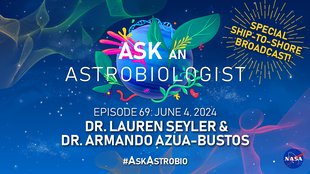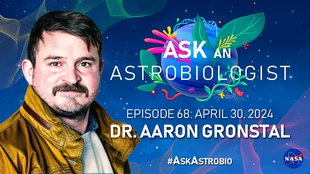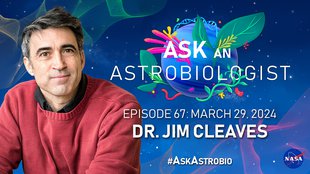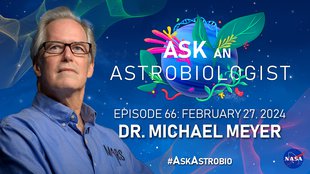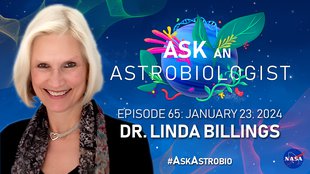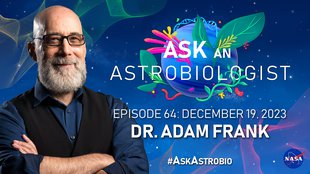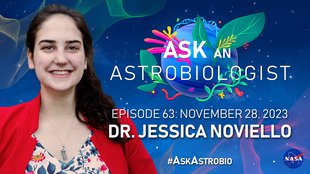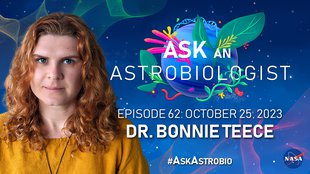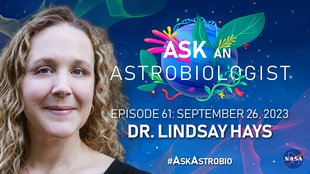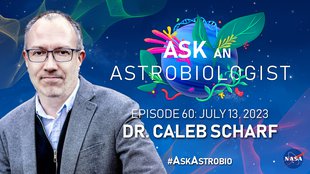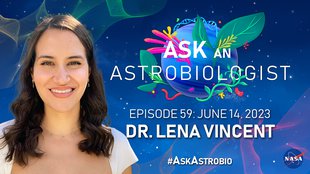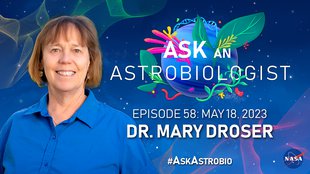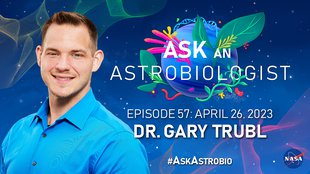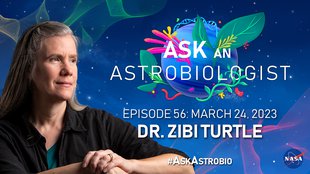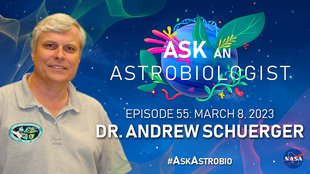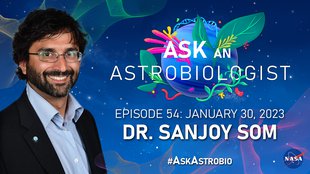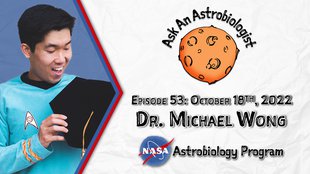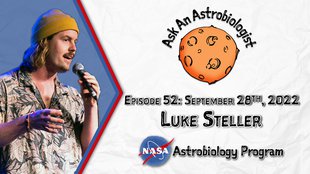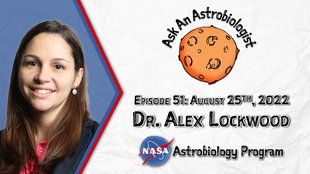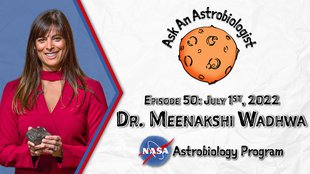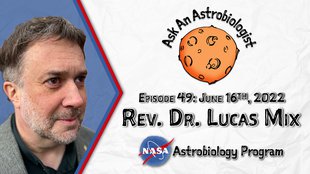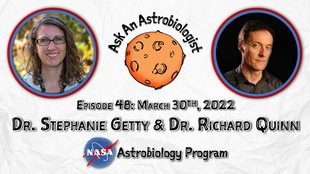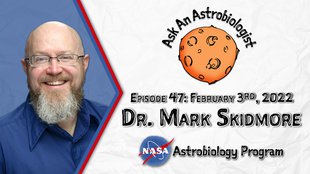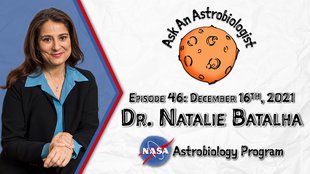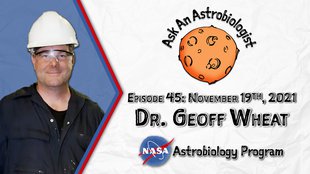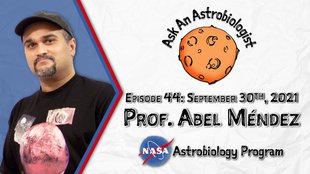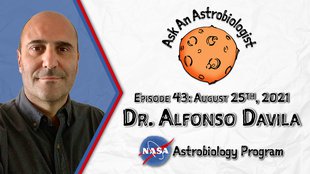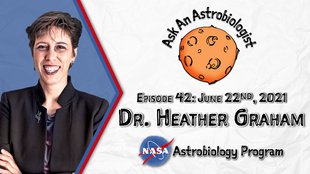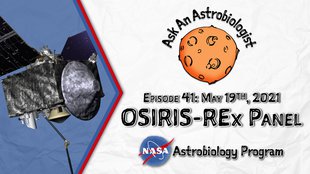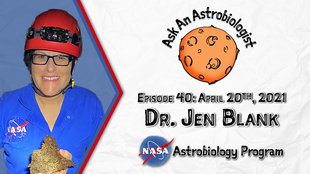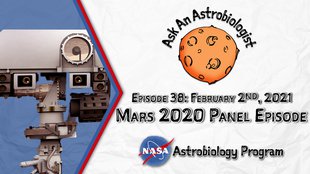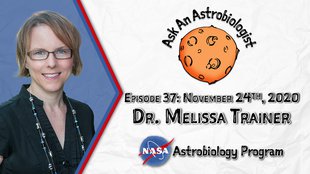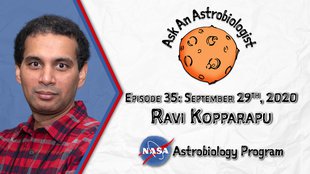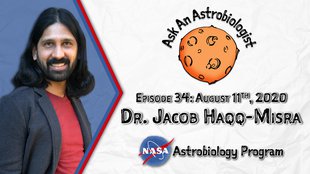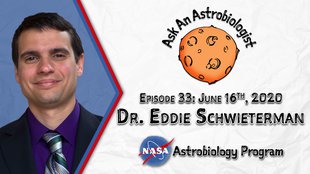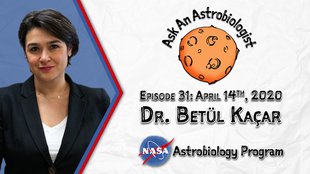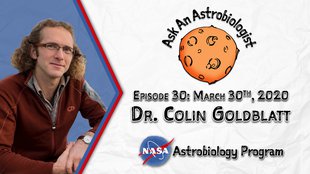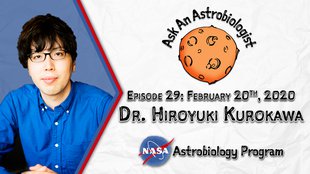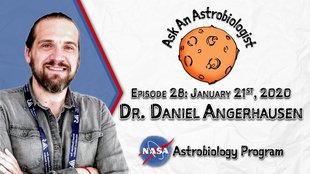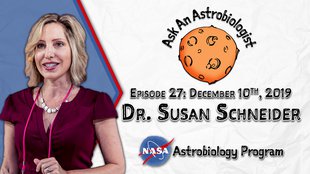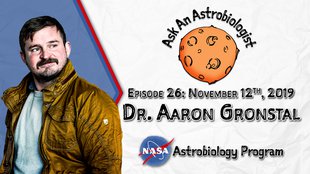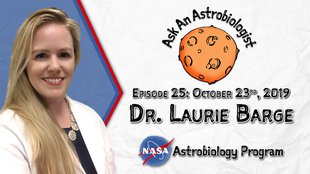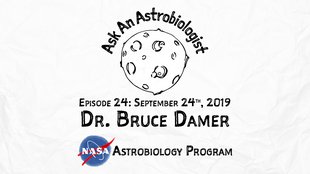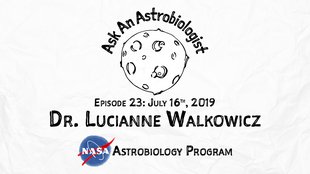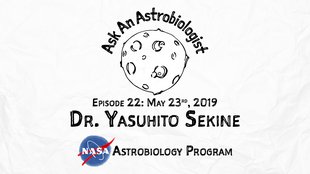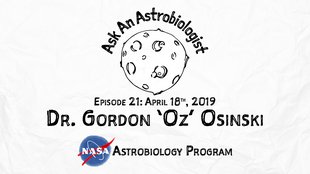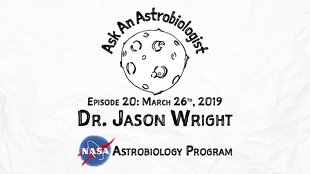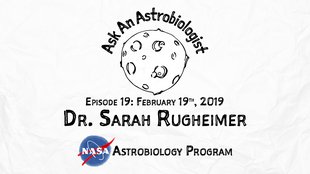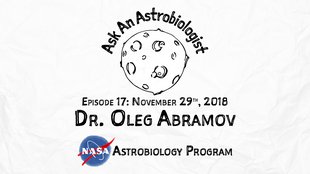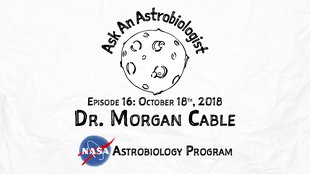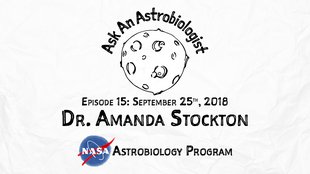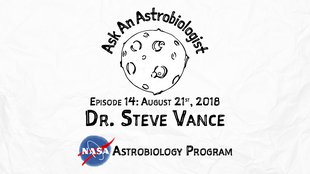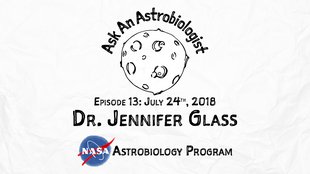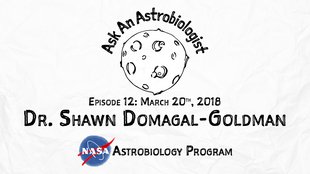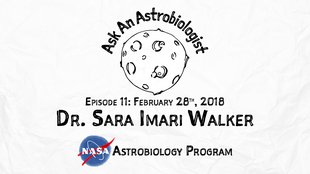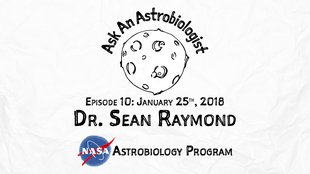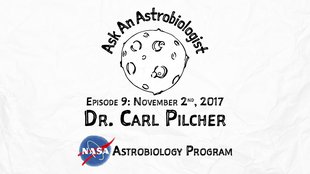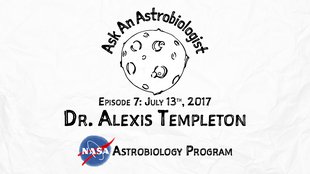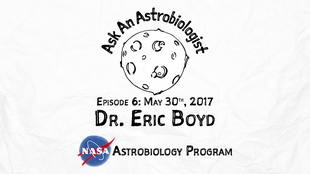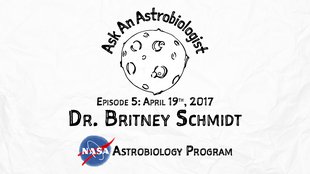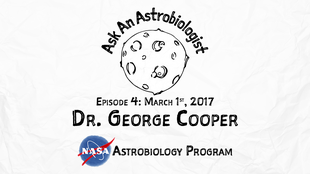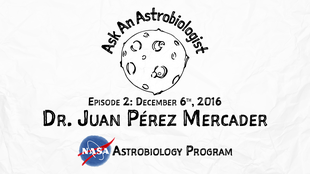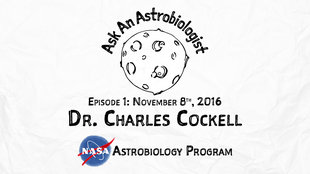
We welcome to SAGANet Dr. Aki Roberge, Study Scientist of the next generation LUVOIR telescope at NASA Goddard Space Flight Center! The Large UV / Optical / IR Surveyor (LUVOIR) is envisaged a highly capable, multi-wavelength observatory with ambitious science goals.
You can read more about Dr. Roberge (@akiroberge) and her work
here.
Greetings, friends of Astrobiology! Welcome to a brand new episode of Ask an Astrobiologist. A show where we celebrate science and celebrate scientists. My name is Sanjoy Som, and every month we bring in a distinguished guest who talks to us about life, about science, and about the future, and this month is no exception. We welcome Dr. Aki Roberge of the NASA Goddard Space Flight Center, in Maryland, in the United States. Before we start, if you have any questions during this show, please use the hashtag #AskAstrobio on Twitter or use the chatroom on SAGANet.org.
Other Recent Episodes
Ocean World Science Aboard the Ship 'Falkor Too' with Drs. Lauren Seyler & Armando Azua-Bustos
The Art of How to Become an Astrobiologist with Dr. Aaron Gronstal
How & When Do Molecules Become Life with Dr. Henderson "Jim" Cleaves
This program is made possible by contributions from the NASA Astrobiology Program. ELSI, the Earth Life Science Institute at Tokyo Tech, and the nonprofit Blue Marble Space. You may notice my new background this month. Mike, if you can cue the background from last month, did anybody guess what it was? It's actually a high altitude lake in the Andes, and it's a very thin lake, so the bacteria that are in the lake cannot protect themselves from the UV radiation by going deep, so they double up on pigments and that's the red that you see in the lake. This is like extremophiles in action at high altitude in the Andes.
If you can guess what my current background is, in particular what these features are, if you know the answer, please use #AskAstrobio and we'll talk about that background next month on the program.
Aki, welcome!
Hi there.
It's no secret that you are the study scientist for the LUVOIR Observatory, which we'll talk about in a minute. It is a very exciting mission concept, but what we like to do in this show is turn back the wheels of time a little bit and I was curious if you could tell us, bring us back to young Aki and what made her into the scientist that we have today.
Yeah, thanks. It's actually not obvious, really, to be quite frank with you. To start with, my dad was a potter, actually, believe it or not, and he was in Japan in the late 60s, early 70s studying pottery. He was teaching English at a chemical engineering company to earn extra cash and that's how he met my mom, who was working there as a chemical engineer. I was born there, I was born in Japan, and we moved here when I was only three months old. Moved back to the states and I grew up, actually, in Vermont in this tiny, one horse town.
Actually, no, there's more than one horse, actually, to be quite honest. One paved road, no traffic lights. When I was a kid, there was a general store, one general store, but that closed long ago. There are no stores in East Topsham Vermont, and it was really a little small farming village with also kind of strangely high proportion of artists living there.
Seems like there's a lot of land to go on adventures.
Yeah, actually. I did go exploring in the woods a lot, actually. In a way, maybe my first, possibly my earliest love in science was maybe more in the biology and zoology area just from collecting tadpoles out of a pond in spring and watching them grow legs. Then, as time went on, I had an interest in science, even when I was a little kid, although I'm not sure I was that conscious in that way.
Then I started high school. I took my first class, which was biology. I'm like, "Oh, this is amazing! I want to be a biologist, and in particular a molecular biologist". We actually did a little of that and then I took chemistry. Oh, this is even better. I'm gonna do chemistry, and then I took physics. I'm like, okay. That's all right. That's cool. Then I did lots of other things too. I spent a lot of time in the art room doing art. I read veraciously, I always did. Mostly fiction. Sci-fi, fantasy, mostly and mysteries.
Then my senior year in high school, I'd finished all the science classes at my high school and so I was allowed to take the freshman level science classes at the local college, which was Dartmouth, actually. I took astronomy. I was like, "Oh, yeah, mm-hmm”.
You had the mindset of an astrobiologist, interest in chemistry, biology, physics, astronomy.
Yeah. I will say my second favorite topic in science probably is biology, in fact. Then it was time for undergrad and I was at the time super happy to get away from this tiny, tiny one horse village. I went down to Cambridge to start a bachelor's degree at MIT. I did a bachelor's degree in physics with a minor in planetary science. At MIT, then I followed the usual path of a scientist, which means you go to get a bachelor's for four years and get your bachelor's degree, although actually I took five.
Then you start a PHD program, which I did at John's Hopkins University in Baltimore, and there I studied astrophysics. I got a PHD in astrophysics, and then I did what many scientists do, most scientists do what's called the postdoc. The best analogy for that is basically an apprenticeship. You spend three years after you get your PHD, you spend three years doing research with a mentor or an advisor and you really put your head down and focus on learning all the other things you need to do to be an independent scientist that are hard to teach in school.
Okay, now I have to come up with my own questions and come up with my own plan for how I'm gonna solve them and find the resources that I need to do that, whether that's writing proposals to get to acquire new data or proposals to get money to work on those new data, and just learning how to manage yourself as an independent researcher, and those apprenticeships, those postdocs are a feature of science.
A network with other scientists too, right?
Yeah, that too. That apprenticeship is an important part of, one of the important things you need to do, then, is broaden, meet more people, talk to more people, broaden your collaborations, and it's also a good opportunity to start taking your research in your own direction, sort of, maybe more away from what your PHD advisor was doing. Yeah.
You talked about mentors. I'm just curious if you could tell us a little bit about some of the influential people who guided your thought process as you became an independent scientist.
Yeah, that's really interesting. First of all, I have to give a huge shout out to my undergraduate business advisory who is Jim Elliot at MIT. I think he's most well-known. He was the person who discovered the rings of Uranus. He was a solar system scientist, but his legacy to science was more to do with the fact that he had a huge stable of undergraduate researchers. He was incredibly committed to teaching and he basically never said no to anybody. If you walked into his office and said, "I need to do research, or I want to do research. Can I work with you?" He basically never said no.
Many of his students are still active in the field and he was wonderful. I remember earlier when I was working with him, he taught me my first lesson in science, in a way, one of my first lessons in science is, don't walk into my office without an error bar.
Data without an error bar is meaningless. It's true.
Yes, exactly. Yeah. Data, a fact without a certainty is useless. Then my thesis advisor, Paul Feldman, at John's Hopkins who was also a solar system scientist, he studied comets mostly. He studies comets mostly, actually. He's retired, but still working. He taught me the second lesson was that a second really important lesson was what's the question? Look for the important question that actually matters and answer it as best you can and then move on.
Move on instead of having not end up going down a rabbit hole of ever increasing detail that doesn't necessarily answer the high level question. It was kind of a good balance between the two of them of rigor and precision and eyes on the prize.
Wise words.
Yeah, together, they gave me fantastic combination, actually.
What was your PHD topic?
Actually, my PHD topic, let's see, what was the title? Ultraviolet Spectroscopy of Circumstellar Discs, I think. What it was really was I was looking at the materials that are in these rotating discs around young stars. In those discs, we think planets are forming. They're forming out of these materials, and particular, I studied the stage when you've build up tiny, tiny, interstellar dust grains that got built up into comets and asteroids and then they're starting to smash together and some of them stick and some of them break up. That material and a lot of debris is created when that happens. These discs are called debris discs.
They correspond we think to late stages of the formation of rocky, terrestrial planets like the earth. I was trying to look at the materials, the composition of those materials in those discs to learn something about the building blocks of rocky planets around starts that are very different from the sun. That's why I was doing, and that still is my personal research when I get a chance to do some. You know?
Very cool. Could you tell us a little bit about how spectroscopy works and why that's important?
Yes. Spectroscopy is, if people are super familiar with imagine, this is taking pictures. That tells you what something looks like. Spectroscopy is how you try to find out what something's made of. Say light from a star passes through a cloud of gas and as the light passes through that cloud of gas, the atoms and molecules in that gas can absorb, can take out particular colors of light, particular wavelengths of light, particular colors, and each molecule or atom has a particular finger print of what colors, what exact colors of light it can absorb. If you then record the light, from the star that passed through the gas and then record it, you'll look for these dips in the light, a particular colors, wavelengths, and you look for that pattern and that tells you ah, that's carbon monoxide, for example, or that over there, that's oxygen gas or something like that.
That's basically how spectroscopy works. You're looking for ... yeah.
Excellent. The reason I ask you that is because this is important information when studying the composition of atmospheres on exoplanets, which is where LUVOIR is gonna get really cool data if it ever flies. Perhaps in your own roads as a study scientist for LUVOIR, can you tell us a little bit about that telescope?
Yes. I'm working on a, it's a NASA mission concept study for a mission that at the moment we're calling LUVOIR. I know the acronym sounds like it's French, but it actually stands for Large UV Optical Infrared Surveyor. It's not a great name because we're in the early stages. You don't need a fancy name at this point, but it's basically a concept for really a super, duper, duper Hubble that would be a really general purpose observatory, like Hubble is, like the James Webb Space Telescope will be that has, it looks in a broad wavelength range from the ultraviolet into the near infrared with a bunch of different kinds of instruments that could be serviced or upgraded and it would have broad capabilities.
Like Hubble does, the capabilities to answer questions that we can't think of, that we haven't thought of yet, but one of its key science goals, which is why we're here, it's really key science goals, is to actually use spectroscopy like you said, the spectroscopy you mentioned, is to study the atmospheres of rocky planets that are in the habitable zones of nearby stars that are like the sun.
What does that mean?
Yeah, okay. The whole goal here is we want to understand the uniqueness of the earth and are we alone in the universe? Right? What do we think? The first question, what is it about the earth, I'm looking out my window for the moment, that makes it hospitable for life like us? Well, liquid water is one thing, right? All life on this planet needs liquid water at some point in its reproductive, in its life cycle to survive. Astronomers, on the basis of that simple observational fact about the earth, sort of calculated, okay, well what's the distance from a star around a star? What's the sphere around a star within which a planet like the earth would receive the right amount of star light, sunlight, star light, to have liquid water on its surface?
That's that zone is what astronomers call the habitable zone. For the moment, astronomers are looking for planets that are basically like the earth in our search for habitable conditions and for life because for a large extent, not because life can't exist in other ways like on the earth, just look at your Europa: maybe you have life underneath this thick shell of ice in a subsurface ocean.
Europa, meaning a moon of Jupiter, of course.
Yeah, yes. Astronomers, we are focused on the earth. Sometimes people say, "Well, you're ignoring all the other kinds of life that could be out there" but we're not doing it because we think that the only kind of life that can exist is earth like life. We're doing it because earth is in fact unique in the solar system in one way in that it's the only planet that's abundantly covered with surface life that is actually effecting the planet's atmosphere. Most of the oxygen in our atmosphere comes from life and the methane, most of the methane in our atmosphere comes from life.
That's probably the only kind of life, only kind of significant we can actually detect from interstellar distances any time in the foreseeable future.
If LUVOIR was around another star and looking at earth, it could tell that life was existing on the planet? How?
That's our goal, yeah that's our goal. In particular, I'm hopeful as a personal goal is that at LUVOIR should be able to tell that if it was looking at the earth from far away from interstellar distances that it may be able to tell the earth was inhabited throughout the whole inhabited history of the earth. Earth's atmosphere, earth's been inhabited for almost as long far back as we can see, as we can tell, but the atmosphere wasn't always the same. It was always being effected by life but in different ways.
This would be a time if you want to talk about the Archean earth now, Sanjoy, this would be a good time.
Yeah, I'm an Archean scientist and understanding how the earth has evolved through time and the atmosphere gives us a perspective of known, habitable, worlds. In fact, the easiest exoplanet to study is our own planet early in its days because the atmosphere was completely different in composition and in structure and was very much alive. That's where I think geology can inform astronomers like you and that's the beauty of astrobiology and we have scientists from all these different disciplines working together to understand whether there's life elsewhere, so that's cool.
Yeah, no it absolutely does. I'll say that in the early not that long ago, astronomers were so focused on the modern earth that I think didn't pay enough attention to the fact that the earth didn't always look like the modern earth. In the LUVOIR study, we are in fact trying to pay a lot more attention to that and make a system, make a tool that could tell, could take data that could at least tell that all the different ways the earth looked because of life during its whole history of life on earth that it would be able to make those measurements to tell it was inhabited.
We're also gonna look for how many planets are there out that have conditions on them that would be hospitable for life like ours, for earth like life, whether they're inhabited or not. That is also an interesting question in my mind.
The point of, one of the points of LUVOIR, it's a really, I should say, it's a big mission concept. This concept is really enormous. I think it's in the eight to 15 meter diameter range. For comparison, Hubble is only 2.4 meters in diameter. It's really big, and it has to be because actually observing and doing this spectroscopy of an earth like planet around a sun like star at interstellar distances is one of the hardest observations astronomers have really thought of really, seriously thought about trying to do.
We need a very capable space observatory in order to do that. That's what we're working on now, trying to figure out the actually design this thing, at least the first stage of design of this thing, anyway.
Is designing a telescope something you've always wanted to do? Is that the reason you joined NASA? How did you go from postdoc to being a study scientist for a next generation telescope? That's an amazing path.
Yeah, it's true. It's not perhaps typical. I must say, it's not really what I expected what I was planning to do in grad school. In grad school I was going down a path of a pretty standard path that normally, maybe if you're lucky, anyway, lead to a professorship at a university. While I was postdoc, my first postdoc while I was at the Carnegie Institution for Science, I had the opportunity to basically, my advisor, Alycia Weinberger, she was asked to serve on a mission concept study for an ultraviolet astrophysics mission concept. She was super busy and she said, "I don't have time for this. Why don't you ask my postdoc?"
I did that and I found that I really enjoyed the work. I really enjoyed the creativity and the ... creative puzzle of thinking about future missions, figuring out the questions and how to answer them and the tools to answer them. At that point, I kind of realized that I really would rather do that than do some boring classroom teaching. As important as that is, that's probably not my… it's not my forte. That led me to a postdoc at Goddard, actually, and then the rest is sort of history.
I want to go back to this problem solving process. People that I encounter sometimes think that us scientists are kind of the aliens. We're this weird breed of people that think differently, but not really. We use the scientific method.
Yes, in some respects that true. If you're a parent talking to a child or an adult talking to a child about the thought process that goes into becoming a scientist or just being a active citizen, what would you tell them?
Yeah, I was thinking about that this morning and I guess I'd put it, I'd start like this, basically, this statement and that is everyone can do science. By that I'm actually not even talking about everyone, anyone can be a scientist, as true as that is, my point is that everybody actually uses the scientific method in their lives whether they are realizing it or not. The crux is basically you have a fact, and you need to explain it. You make a theory, and you test it, if it fits, good, you can do something about it. If it doesn't fit, you make a new theory and you figure out a way to test it and get gather new facts.
When I say it like that, it sounds weird and science-y, but actually, the analogy for this is troubleshooting. I can't load this webpage. What's wrong? Is it something wrong with the webpage? I will check a different webpage. Can I load that one? Oh I can't? Okay, my Internet is down. Why is my Internet down? Is it just my computer or is it all of the computers? Oh, it's all of the computers. Maybe my router is bad. You know, is it plugged in? Oh hey, my kid just unplugged the router. Ta-da!
This is that process, I have a fact, okay, I'm gonna make a theory. The theory is this webpage is broken. I test it, oh, no that theory doesn't fit the new fact that I just gathered, so you test it again. The whole concept, the whole process of trouble shooting is basically the scientific method.
In this process of troubleshooting your telescope, do you think we'll find life out there?
You know, I do, actually. I tend to be in the optimistic camp on this one. I think recognizing it might be harder than finding it, but the fact is, it seems like life on this planet arose as fast as it could. Every year that goes by I see new papers coming out from people who study the early earth saying, "Oh, the origin of life is even earlier, and earlier, and earlier". It seems that the second it could, life arose on this planet, which kind of suggests it's a pretty robust process that wants to happen.
Also, too, the range of conditions that life on this planet can not only survive, but thrive in is extraordinarily large. Again, we learn more about that every year. That's what field astrobiologists do, I guess. I also too, the ingredients of habitability. Water, carbon, those materials we've learned, these are common materials in space. I feel like there is circumstantial evidence that I would say maybe that nature may have stacked the deck in favor of life. We have to look for it. That's the theory, and LUVOIR is the experiment to make the first tests in a way.
That's so cool to be part of.
Yeah. It would take a long time.
Yeah.
Yeah right, see a large NASA mission like this, this takes decades to come to fruition, if it ever does. That's no guarantor on that one. If we're lucky, we're lucky, this thing will launch in the 2030s, before I retire, hopefully. I hope, but hey, if it doesn't, that's okay. I will happily enjoy the results from a deck chair, that's fine. I guess that's another thing about being an NASA scientist. You have to have a lot of patience and stick-to-it-ness because the stuff we do, the really ambitious stuff, it takes a long time and a lot of people.
That's very true. Most missions that go to space take decades to develop from the initial idea to flight. Decades. I wish you good luck on that path. We've been talking for about half an hour. I think it's a good time to open it up for questions from the audience. Otherwise, we'll talk about exoplanets forever, which I have no problem with. Let's see here.
Who shall we start with? Graham. Hi, Graham. His question is, "What do you think the next major discoveries will be with regards to exoplanets and star system evolution?"
Huh. Interesting question. It's really hard to answer because the whole field of exoplanets has been, to be quite frank with you, very unpredictable and unexpected. Everything about it has kind of been a shock to theory from its very beginnings. The thing I'm looking forward to, actually most for the relative and near term here is the James Webb Space Telescope, NASA's James Webb Space Telescope, which will be launching in 2018, is going to try and take a close look at rocky planets that are in those habitable zones of red dwarf stars.
These stars are really different from the sun, they're really low mass. They're low mass and they're cool. It's really interesting, the thing I want to know, what are the atmospheres of those planets like? Can they even have atmospheres? It seems like planets around these low mass stars, these really small red dwarf stars are extremely common. They're the most common type of star in the galaxy and it looks like they have a lot of rocky planets around them. The next step is great. Do they have atmospheres and what ... we even start to begin to find out what those atmospheres might be like. Are they earth like at all? Can they even be?
I think that's kind of what I'm looking forward to in the next five years we're gonna start taking a look at that question, actually.
It's amazing how the galaxy keeps surprising us in terms of the diversity of exoplanets that exist. It's unbelievable.
The first ten years after exoplanets were discovered, I swear I could probably rattle off four different ways from theory to prove exoplanets can form, and yet they exist. I guess they existed. They from the beginning, they were a challenge to theory, absolutely, a planet formation theory in so many ways. The range and diversity and the robustness of the planet formation process is enormously greater in so many ways than we had any idea when I was first being taught this theory in undergrad.
This is goosebumps creating. We should move on. Janet Ashley Pollock, asks whether the LUVOIR telescope could only detect carbon based life or would be able to detect also other based life.
Oh, I think it could detect other kinds of life, but whether we'd recognize that we'd done so or not is another question. It's hard to know. It's hard to make a prediction for what the signature, the atmospheric signature. What bio signature gases life that's very different from the earth could produce. We don't know. We don't even know enough to design a specific test for that. The best we can do is what we are trying to do with LUVOIR is to make a telescope and an instrument, a tool that is flexible enough to make unexpected discoveries, make measurements that we could discover things that we didn't plan to discover.
That's the best we can do. I have to say, yeah, maybe we could detect it, but would we know we had? That's a tricky question. That actually will require a great deal of both work from about people who study life on this planet in extreme conditions, people who try to think about the theory about what kind of life can exist and how it would work. That's a huge type of field, actually.
LUVOIR could then detect that a planet is inhabited but would not be able to tell what kind of life is there, right? Arguably, any kind of life would cause a thermodynamic disequilibrium in the atmosphere, which would be the presence of methane and oxygen, right?
Right, see LUVOIR could detect what he just said, disequilibrium gases or what we also call a biosignature, well, disequilibrium gas is basically these are two gases that are present together that just shouldn't be there under the laws of chemistry of physics they shouldn't be there together. They should destroy each other really fast and if they are there together, you have to, "Okay, what other science is left in the building I can invoke to explain this? Ah, Biology".
That disequilibrium is what we call a biosignature. Problem is, there are other ways of getting disequilibrium in atmosphere, too. Volcanoes and stuff. It would be hard to interpret. You'd really have to ... just taking the measurement would only be the beginning. Seeing a disequilibrium. You'd have to try and make sure that it isn't caused by some physics or chemistry that you didn't think of yet that is actually caused by life.
I can't wait for that session at a future astrobiology conference. Did we detect life?
Yeah, actually, you know…
How incredible would that be.
Right. One of my colleagues who spent a lot of time thinking about what we would call false positive bio signature, ways of getting these disequilibriums, gases that shouldn't be there together, but about the false positives, whether that could happen without life is actually Sean Domagal-Goldman, here at NASA Goddard. He might be a good person to ask. If you want to hear about that.
Yeah, we should have him on the program, for sure, this reminds me. Those of you who are viewing, if you have any scientist that you would like us to interview, let us know #AskAstrobio or send us a note on SAGANet. Okay, what is the next question here? Ah, it's another one from Graham. He sees your PSOJ318 poster on your wall. His question is, "If you had to guess, how common do you think rogue planets are, and what is a rogue planet?"
Well, I don't know. I haven't heard that term before. Maybe he means, I'm assuming he means free floating planets, planets that have escaped their star and are just floating in interstellar space.
Yes.
Which is amazing. Apparently, they exist. Now that we know a little more lately about the planet formation process, in retrospect, you always say, "oh, well of course we should realize that". Hindsight is 20/20 but the fact is, during the planet formation process, a lot of things get ejected from the system. We always knew that comets and asteroids were getting ejected. Maybe we should have guessed that whole planets could be ejected too. Now, we find that there are free floating planets out there in interstellar space that were formed, presumably, formed around a star and maybe two planets had a close encounter and one of them god knocked out of the system and just went off. I think it's a sad thing to happen to a planet because it will get very cold and dead, eventually.
I don't know. That's about what I know about the free floating planets, actually, I don't think we know much more than that. Again, one of those things that we were not expecting to happen with exoplanets.
That's so cool.
That's the theory.
Either that or it's a death star, who knows. Richard Gordon asks, "How far away could we detect lightening on an exoplanet?"
I don't know. I don't know if we can detect lightening on an exoplanet at all, actually yet. I would like to do some calculations to see if we could, but we haven't done them yet. We definitely can't do it, and I don't think we can do it anytime soon. Maybe with LUVOIR, but I haven't done any calculations to see if that's feasible. I would love to do that. That would be cool.
That would be cool.
I will put somebody on that.
Awesome, yeah because that would be an indication of weather on an exoplanetary system, which would be cool.
Yeah. We do want to be able to look for weather. For example, we want to have the ability to observe the planet quickly enough that we could look for the planet spin. Look for its day night cycle and seasonal cycles and then once you have that basic pattern, you could look for variations around that cycle that would be indicative of weather. We want to have that capability with LUVOIR, definitely.
Janet, I'm gonna ask you to rephrase your question, because I don't quite understand it. I'm gonna skip you for now, but please rephrase it and we'll get back to you. I'm gonna go to Jacob who is asking, "What is the most unequivocal spectral bio signature LUVOIR could detect and would this convince non-astrobiologists?" Good question, Jacob.
Okay, I think the first part is easier to answer than the second part. I think at the moment, the gold standard in life detection would be ... it's interesting. Detecting one molecule by itself is not a bio signature. It has to be at least a pairing together to show that you've got this disequilibrium that Sanjoy was talking about. For earth, anyway, for an earth like planet the gold standard would be the simultaneous detection of both O2, molecular oxygen, and methane in the same atmosphere. At the moment, we think that would be the gold standard.
It's hard to do, especially the methane because we don't actually have that much methane in our atmosphere, thank God. We used to though, in the Archean period, we did. It's not easy to do so we're also studying ways of trying to re detect oxygen and maybe two or three or four other molecules without being able to detect methane could we still get there. That would maybe be the silver standard of life detection. The key point though is that one molecule by itself isn't a detection of life. It's got to be a complex, a chemical system. You see what I mean.
As far as would anybody believe it? I don't know, Sanjoy, maybe you could answer that better than I.
It's tough, because oxygen of course is not only produced by life. In certain planetary conditions like Sean Domagal-Goldman showed, you can form geologically an excess of oxygen in atmosphere. It could be a false positive, which is an important trade study to do.
That's why just detecting oxygen by itself, as intriguing as it is, isn't enough. I think Sean would say, still, if you've detected both oxygen and methane, then you'd be pretty dang sure that wasn't a false positive for life. Best I could do on that one.
That's great, thanks. Do we have any other questions? Oh, there's Janet rephrased question, thank you. Life on the early earth, presumably started in water. Did the early earth atmosphere contribute to that early life?
Contribute to the early life? That early life effected the early atmosphere, for sure and as I was hinting at before, in the Archean earth, the life on this planet was, I guess you call methanogen. They're still around today, just not as many as there were in the early times and they didn't produce any oxygen. We had an atmosphere that had a lot of methane in it, much more than there is today. Did the atmosphere contribute to life? I don't know. I don't know. Maybe I don't understand the question, or maybe I just don't know the answer.
Yeah. It's interesting to think how the environment effected biological evolution. It certainly did, I think. We can talk about nitrogen for example, which is a fundamental property for biology, but it's probably too much for this conversation.
I think that's another topic.
Do you think LUVOIR, if it was scanning from far away the early earth, when there was no oxygen on our planet, could it tell whether it was alive or not? Do we know enough about the earth's atmosphere?
We are trying. There are theorists who are working hard to figure out exactly what is the test, the observation tests that we would need to do to find out to know to be able to recognize the Archean earth was inhabited. Obviously, methane, but again, we can't just look for one molecule. We need something else, another thing to really show that this can't be just chemistry or physics making this methane.
Maybe, yeah ... I don't think we're quite there yet, but people are working on it. In particular, I can think of another person here at Goddard who's working on it and that's Giada Arney. She's working on specializes actually in what the Archean earth would look like from outside. I think she does have an idea, but I don't want to explain it because it's her idea and I don't really necessarily understand it well enough to explain it. I think she does have an idea, which when she's done, we will definitely try to incorporate into the capability into the LUVOIR mission concept.
That's again, an example of how geologists and astronomers can work together because the geologists can tell you what the chemistry of the atmosphere and what the physical structure of the atmosphere based on what the rocks are saying because rocks are the history book of the planet and if you can read them, you have a lot of information that comes out of it. From that information, astronomers can make conclusions about exoplanets. That's just awesome. That shows the beauty of astrobiology.
Okay, let's give a shout out to our engineers here because someone has to figure out what I do is I take information from theorists that you would get a theory of what would happen, then someone like me figures, okay how would I observe that theory? What is the measurement I need to take to test that theory? Then we turn to the next stage, which is our instrumentalist friends, the people who design instrumentations like, "Okay, I want to make this measurement. What kind of tool, what kind of instrument, tool do I need to make that measurement?" They will come up with a concept for a design of that instrument, and then you turn to the engineers and say, "Okay, I have this thing I want to build. Can you actually build it?" This is seriously takes a village, takes a city, actually to do a large massive mission.
It's extremely multi-faceted with all different kinds of people, people doing all kinds of different disciplines.
I'm glad you mentioned engineers. They are definitely part of the scientific investigation process.
Yes. They don't get a lot of love, but they're important.
They are so important, absolutely. There is this question that I saw about becoming a scientist later in life. Both you and I had the privilege of growing up in a scientific, it's the path we took, but can you become a scientist later in life after a career in something else?
Yeah. You totally can. I'll give one fun example right here from my own personal experience here. I hope he doesn't mind me doing this, but my two summer undergraduate intern from two, three summers ago is Andrew Makowski. His first bachelor's degree was in finance or accounting, he did that for a while and I guess he decided he didn't want to spend his life doing then. Then he became a police officer, actually. He was a Tucson City Police Officer.
He did that for a while, then he decided, "Um, I think I really want to do that science thing after all". He went back to school to get a bachelor's degree in physics while working full time as a campus police officer, actually. Then he realized, which didn't leave him time to do any research, but he realized he needed to do some just to find out what it was like. He had some experience, so he took one summer off from the CPs and came and did a NASA summer internship research project with me.
He did fantastic job on it, and now he is a graduate student studying astrobiology, in fact, and the University of Washington in Seattle. Yes, it is in fact totally possible to become a professional scientist after doing another job, another career. I'm not gonna say it's easy. I'm not gonna say it's easy, but it's definitely possible. I have evidence that it is possible.
Yeah, I switched to astrobiology after a masters in engineering. I can definitely attest that it's possible.
Yeah, and I think Andrew came from even further afield, I'd say. Yeah.
I think you mentioned earlier in this program that you are a veracious reader and a sci fi reader. I was wondering if you have a favorite sci-fi author and has that somehow influenced your science or created some new ideas?
Oh, I would suspect so. Yeah, I'm a sci-fi nerd from way back. Star Wars. Star Trek probably is maybe even more influential to me, but probably, I would say, my favorite sci-fi writer, the one I would pick or book. Let me just say book or series, actually. That would be Dan Simmons’ Hyperion series. If people know that one. What fascinated me about it was this vision of these really diverse paths that life that originated on earth could eventually go down, become very different than we are. I don't know. I guess you'd have to read the book, but also, too, I have to give a shout out to J.R. Tolkien because Lord of the Rings, if I was stranded on a desert island, for the rest of my life and I could only take one set of books with me, it would be in fact, Lord of the Rings.
Then also, too, like I said, Star Trek, let's not underestimate the influence of Star Trek. All kinds of scientists that in particular astronomers and astrophysicists. The vision of exploring space, of actually we're gonna fly out and explore space as species is very compelling for me. It's like a long term goal. Millennia.
Yeah, both Tolkien and Star Trek show that interspecies living together is gonna be difficult. Do you think that will affect humans as well?
Yeah, difficult but possible. Actually, I think it's interesting to talk to and interact with life that's different than you are.
The next question is by Graham again. He asks, "What are your favorite ways to share your research with the broader public?"
I like doing stuff like this. I like chatting. Probably, that's probably the primary way. I do in fact also give, well not a great many, but a fair number of public lectures in smaller venues. That's a good way too. That's enjoyable too, but the best part of that, again, I always find is the questions, when you just get to chat about things. People ask questions and you can answer them. People ask great questions and it actually can get more out that way then just from my, "This is what I plan to say" to me that's the best part. I like things like this, I like the questions at a public lecture.
I don't write any popular articles because ... I'm probably not very good at that actually.
To each our own expertise, that's great.
Yeah.
Let's see, do we have any more questions on the chat? No, all right. I have another one for you. If you had a room full of early career scientists, what kind of advice would you give them based on the lessons learned you've had in your career so far?
Okay. Early career scientists, lessons learned.
Let's say at the undergraduate level, for example.
Undergraduate.
Or younger.
Yeah. The most important thing you can do in undergrad isn't necessarily to store up a bunch of facts. It's not that. It's to learn how to ask the right questions, how to think. How to ask the right questions and how to think, plan to answer them. That's the key. That's the root core of research. If you haven't had a chance to do any research, make time. Somehow, make a way. A ten week summer research project, anything.
That's how you'll find out if you really enjoy that process. Asking questions and figuring out how to answer them. If you really enjoy it well enough, enough to dedicate your life to it. I'd say what other piece of advice? Respect other people's expertise outside of science, in particular is what I mean. One of the things you learn at NASA very, very, vividly, nobody does anything by themselves. It takes big teams to do something really big, it takes big teams with a diverse skill set.
Sometimes, the success of a mission will hang on your financial administrator or the manager, the project manager, the science writers and graphics people that you're working with. Not to mention 15 different kinds of engineer. It's important to respect and value everybody else's expertise and not think that their expertise that, "Oh, well I'm a physicist, I can do bookkeeping". Well, yeah, really? No. You'd be surprised, actually. Maybe not very well. That's another moral that I would put out there, actually.
Cool, thank you. We're almost out of time. Is there any last thing you would like to add based on our conversation, Aki?
Gee, I don't know. I guess just to come back again to the point I made about science that science and scientists, this isn't, we're not witches and warlocks here. These aren't secrets what we do. The scientific method being a scientist, these aren't secrets. This is a public process. It's a thing that everybody is doing science, approaching the world like a scientist is something that humans do. I was trying to explain with the trouble shooting, this whole idea of trouble shooting.
I just want to reemphasize that, that people science. It's one of those things people do. The thing that all those years of education and training did for me was in a way to make me a ... to give me the tools to be a super user of science, but we are all users of science.
Those are fantastic, wise words to end with. Aki, I want to thank you so much for taking the time out of your busy schedule to talk with us today. It's very appreciated. It's been a fascinating conversation and all of you that are watching, join us next month for Ask an Astrobiologist. Until then, stay curious, and ciao for now.
